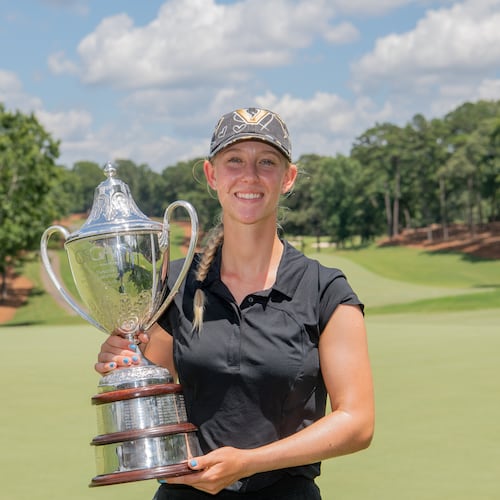IF YOU GO
What: Publix Georgia Marathon and Half Marathon
When: The marathon and half-marathon races starts at 7 a.m. Sunday. The 5K race starts at 7:30 a.m.
Where: The start and finish lines are Centennial Olympic Park.
Expo: There will be a fitness expo from noon-7 p.m. Friday at the World Congress Center, building A, hall A2.
Janelle Alexander-Sumpter was skeptical the first time she was invited to run with a group of women in Atlanta two years ago.
“Running in the street isn’t something I thought black women did,” she said.
But Alexander-Sumpter met up with her friend and her group of friends. Alexander-Sumpter watched the pack pull away from her on their three-mile trek. But as she reached the end of the route, instead of finding no one, there stood the group of women, cheering her as she crossed the finish line.
No one left early. They didn’t know her. But they were familiar with her story. They are Black Girls RUN!, a group founded in Atlanta four years ago that now has more than 61,000 members nationwide.
You will see their members — or hear them — during Sunday’s Publix Georgia Marathon and Half Marathon. Some of them will be wearing black and pink shirts, the group’s colors. They won’t leave a race early until everyone in their group has finished. They will constantly offer support, just as they did for Alexander-Sumpter.
Alexander-Sumpter weighed 220 pounds that August day. Today, the 50-year-old weighs 156 pounds. It’s the smallest she said she’s ever been.
“It truly was Black Girls RUN! that started me walking and giving me the motivation and seeing the support they gave me,” she said. “Had it not been for them, I know I wouldn’t be doing what I do now.”
Black Girls RUN! was started in 2009 by former college classmates Toni Carey, who lives in Norfolk, Va., and Ashley Hicks, an Atlanta native and resident, as an online blog. They wanted to provide their perspectives on how black females could try to improve their health by running.
More than 58 percent of black women are obese, according to a Centers for Disease Control study in 2010. That percentage was 38.4 in 1994. In addition, hypertension in blacks in the United States is among the highest in the world. From 1988-94 through 1999-2002, the prevalence of high blood pressure in adults increased from 35.8 percent to 41.4 percent among blacks, and it was particularly high among black women at 44 percent.
Before joining Black Girls RUN!, Alexander-Sumpter said she had learned to accept being big. During a doctor’s appointment, he noted that she had gained 20 pounds in a year. She noticed the alarm in his voice. She was concerned. She didn’t suffer from diabetes, but she did have a family history that included that disease and high blood pressure. She said she needed to do something.
She began walking at Stone Mountain. She set small goals such as making it up a hill without putting her hands on her waist. Today, she can run around the whole park.
“And it doesn’t faze me,” she said.
Alexander-Sumpter also is an example of the challenge that Carey and Hicks faced. In a national survey done earlier this year by Running USA, just 2.3 percent of the 24,794 respondents were black women. The majority of the respondents were “core runners,” or those who participate in numerous events. So while the small percentage of black respondents doesn’t accurately represent the demographic’s participation in the sports, it does provide some anecdotal support of Alexander-Sumpter’s belief, one that even she acknowledges is odd.
But Black Girls RUN! is gaining traction. Carey and Hicks’ journal evolved into running groups. Thirty were started in September 2010. Thirty more added a few months later. There are 69 groups today.
The members site is members.blackgirlsrun.com. Groups can be found on Facebook or Twitter. Atlanta is the largest with more than 10,000. More than 175 BGR! members have signed up to compete in one of Sunday’s races.
The running community has embraced the group.
“Black Girls RUN! is having a positive impact on running in that it is engaging and educating a group of women that have been historically hesitant (almost nonexistent) to pick-up distance running as a sport and healthy lifestyle activity,” Jean Knaack, executive director of Road Runners Club of America, said in an email. “They are engaging black women in a positive manner and are working to break some of the negative thinking that hinders black women from engaging in fitness such as bigger is better when it comes to body size. They have a positive message about health and fitness that seems to be resonating with women of color.”
Knack said RRCA would like to see Black Girls RUN! adopt a more formal structure to improve coaching and safety. But Black Girls RUN! is loosely structured by design. There are no membership fees and they ask only that members participate in the weekly runs. You don’t have to be black, and you don’t even have to run. Walking is fine. You do have to be female.
Spokeswoman Jay Ell Vaughn describes the organization as a support system to help women reach their health-and-fitness goals.
“It’s very important, and it’s great that you can see other black women who are just like you,” said Gwen Jenkins, who found Black Girls RUN! on Facebook and now exercises with the Glenwood Park or Grant Park groups. “Some have overcome health issues because of running with the other women in the group. It’s very helpful and motivating to see other women who are adamant about improving their health.”
Typically, each group has a coordinator that leads the weekly runs. Alexander-Sumpter, a special-education teacher at Stone Mountain High School, first met her group in Decatur.
Two years later, Alexander-Sumpter will participate in her fifth half-marathon this year. Her first came in October 2011. She runs between 20-25 miles a week and said people who are interested in taking up the sport need to get a comfortable pair of shoes. Don’t let sore feet slow you down.
Since losing the weight, Alexander-Sumpter said she’s more confident. She feels good. She said her doctor has said she has added years to her life.
She also said she’s disappointed that she didn’t start exercising sooner.
“Before I felt limited; now I feel life is limitless,” she said. “I feel like there’s more for me to conquer, and I am not afraid to meet the challenge.”
About the Author
Keep Reading
The Latest
Featured


